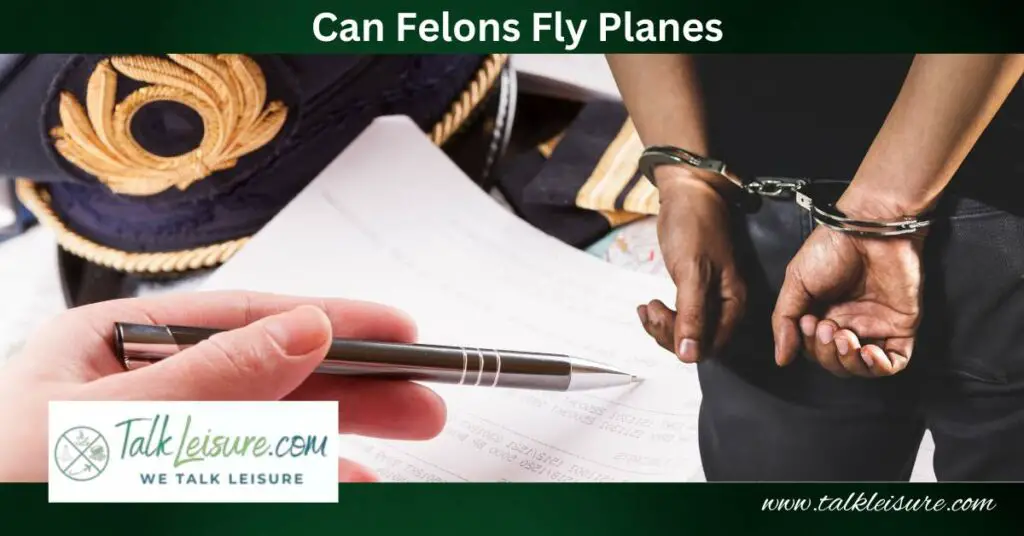Have you ever wondered if someone with a criminal record can become a pilot?
Perhaps you or someone you know has made mistakes in the past and is now considering an aviation career.
The question on everyone’s mind is, “Can felons fly planes?”
Although there is no straightforward answer, it’s worth delving deeper into the topic to understand the factors at play.
This blog post will explore the regulations and requirements surrounding felons and their ability to become pilots and examine some of the challenges faced by those seeking to enter the industry.
So if you’re curious about whether or not a person with a criminal background can pursue their dream of becoming a pilot, keep reading!
Felons with a passion for flying may wonder whether they can pursue a career as a pilot.
The regulations surrounding this subject are complex, but the Federal Aviation Administration (FAA) does not automatically deny pilot certificates based on a felony conviction.
However, a background check and medical exam are required, and the final decision will depend on the type of conviction and the actions taken by the individual following the incident.
Felons can still obtain a student pilot certificate. Still, they may need to wait up to one year before applying for a pilot certificate if their felony was drug- or alcohol-related.
Who Is A Felon?

A felon has been convicted of a crime and sentenced to imprisonment.
This could be any serious offense, such as murder, drug trafficking, theft, or fraud.
They are typically barred from certain jobs and activities—becoming a pilot is one of them.
However, the Federal Aviation Administration (FAA) does not categorically deny a pilot certificate to individuals with felony convictions.
Rather, the FAA evaluates each applicant based on their criminal record, the type of conviction, and the actions taken following the incident.
So, whether or not a felon can fly planes depends on various factors, including their conviction and their behavior since then.
How Are Criminal Records Taken Into Account During The Aviation Industry Background Checks?
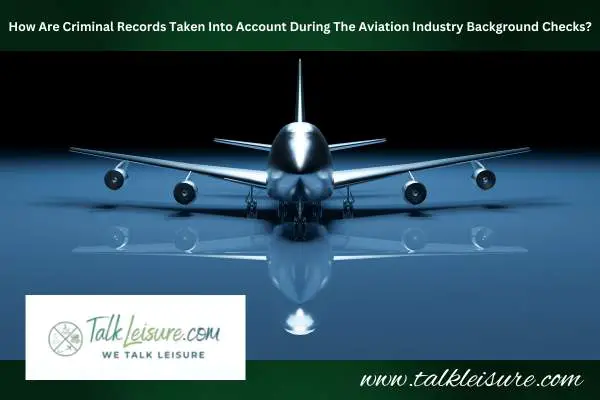
The aviation industry requires individuals to undergo background checks before obtaining a pilot’s license.
The Federal Aviation Administration (FAA) regulations state that airline pilots must be of good moral character.
This includes passing both a criminal background check and a medical examination.
A criminal record can impact obtaining a pilot’s license, but it depends on the nature of the crime, how long ago it occurred, and the type of license being sought.
Certain types of felonies, such as those related to terrorism or murder, will disqualify an individual from becoming a professional pilot.
Recent drug and alcohol offenses may prevent an individual from being medically cleared to fly.
However, if there is clinical evidence to show that an individual overcame their drug abuse issues more than two years ago, they may be able to pass the medical examination.
It’s important to note that a DUI conviction may also temporarily delay obtaining a pilot’s license, as the FAA requires proof of court-ordered alcohol treatment.
Being upfront about any criminal history during the licensing process is also important.
Trying to hide or lie about a criminal record can result in losing a pilot’s license.
Professional pilots are regularly retested for their medical certificates, and the FAA receives driving records.
Felons with flying anxiety might be using drug like valium. Valium also causes dependency and it is not often prescribed when flying.
Felon with such phobias will not be suitable to become a pilot.
Can A Felon Fly The Plane
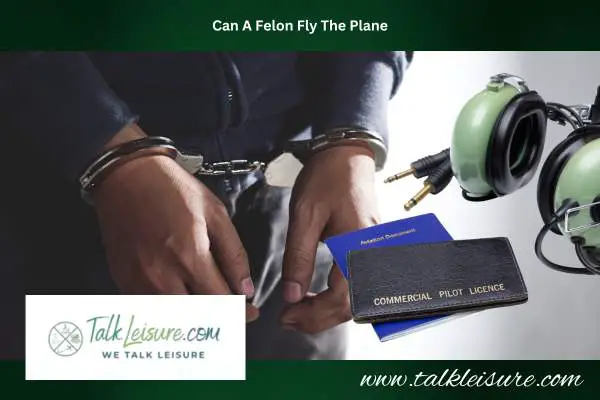
It is a common misconception that a felon can never become a pilot.
However, the truth is that it is possible in certain circumstances.
The Federal Aviation Administration does not automatically deny pilot certificates based on a felony conviction.
The severity of the crime, the length of time since the conviction, and other factors all play a role in determining whether a felon can have a career as a commercial pilot.
To become a pilot, one must obtain a Student Pilot Certificate, which requires meeting certain qualifications, such as passing a medical exam and a Transportation Security Administration (TSA) background check.
Specific types of convictions, such as unlawful possession, use of explosive devices, or drug dealing, may automatically disqualify someone from receiving a student pilot license.
If a person can pass the necessary medical exams and meet all FAA requirements, they may be able to obtain a standard pilot’s license.
This license allows for various flying levels, from private pilots to airline transport pilots.
The private pilot license also allows one to take passengers.
However, even with a pilot’s license, a background check and new medical exam are required regularly, and certain convictions may still disqualify a person from piloting a plane.
For example: a pilot with hernia must solve the issue and get medical clearance before flying the plane.
Anyways, passengers with hernia can fly on plane with proper planning.
How Can A Felon Get A Pilot License?

A felony conviction does not necessarily disqualify someone from becoming a pilot.
The Federal Aviation Administration (FAA) does not deny pilot certificates based solely on a felony conviction.
However, complex factors determine whether someone with a criminal record can have a career as a commercial pilot.
A background check and medical exam are required for most pilot licenses, and the final decision depends on the type of conviction and the applicant’s actions following the incident.
The first step for any pilot, including felons, is to obtain a Student Pilot Certificate, which requires passing a medical exam and a TSA background check.
Depending on the severity and type of felony committed, certain disqualifying factors may apply for higher certification and medical examination.
Felons with substance abuse or dependence charges may face an additional hurdle and should prove the established clinical evidence to overcome this obstacle.
What Is The FAA’s Role In Establishing Guidelines For Aviation-Related Occupations And Licensing?
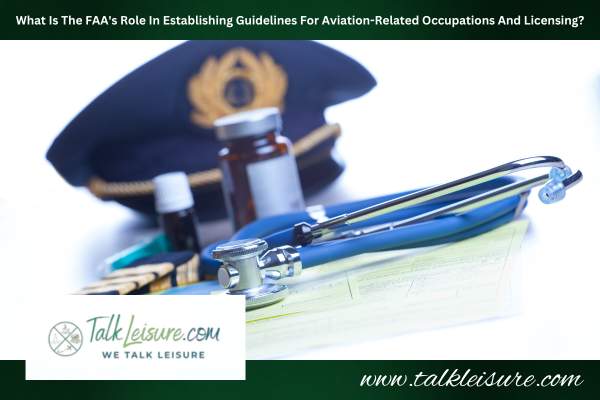
The Federal Aviation Administration (FAA) is crucial in establishing guidelines for aviation-related occupations and licensing.
The agency has established various regulations regarding who can fly planes, including felons and those with criminal records.
While a felony on your record may not necessarily prevent you from getting a pilot’s license, the FAA does require airline pilots to be of good moral character.
However, the agency doesn’t provide a specific definition of what constitutes good moral character.
That determination may vary depending on the specifics of each case.
The FAA also requires all pilots to undergo a background check and a medical exam before obtaining a license, which may affect the approval of a felon’s application.
What Are The Types Of Pilot License Can A Felon Receive?
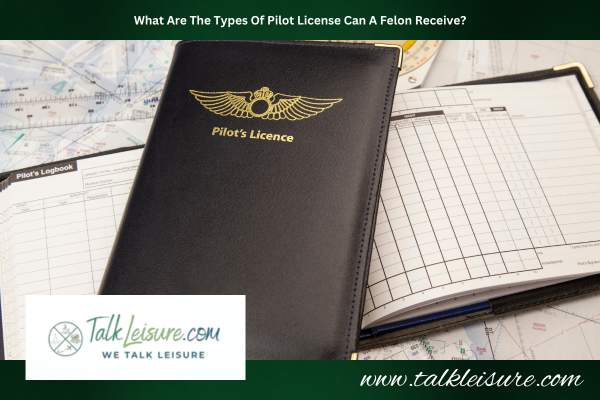
A felon can obtain various pilot licenses, but it depends on many complex factors.
Once a student pilot license is granted, anyone, including a felon, can log solo flight hours.
The next step is to pass the required medical exams, which become more stringent as the licensing level increases.
Requirements for obtaining a student pilot certificate
Many people wonder if a felon can become a pilot, and the answer is yes, in certain cases.
To obtain a student pilot certificate, aviation medical examiners must give a 3rd Class Medical Certificate regardless of previous convictions.
Substance abuse can prevent passing the exam, and individuals convicted of drug or alcohol-related felonies may have to wait up to a year or provide evidence of recovery to receive a student pilot certificate.
Additionally, a Transportation Security Administration background check must be passed to determine whether the individual is a security risk in the air.
It is important to note that some convictions may disqualify individuals from receiving a student pilot license.
Requirements for a private pilot license
In most cases, a felony conviction does not automatically disqualify a person from obtaining a private pilot license.
However, certain requirements must be met before qualifying to obtain a private pilot license.
The aspiring pilot must first obtain a Student Pilot Certificate, pass a medical examination, and meet the same FAA requirements as any other student pilot.
Additionally, if the felony conviction was drug or alcohol-related, the individual may be required to show evidence of recovery before receiving a student pilot certificate.
Specific types of convictions may disqualify someone from obtaining a student pilot license and being allowed to log solo flight hours.
A private pilot license allows the individual to fly with passengers as long as they are not compensated.
In conclusion, while having a felony conviction may present challenges and limitations, it’s not uncommon for felons to obtain private pilot licenses.
The final decision regarding eligibility to become a pilot depends on the specific details of the felony conviction, the time elapsed since the incident, and the actions taken to overcome or rehabilitate it.
Requirements for a commercial pilot license
According to the Federal Aviation Administration (FAA), a pilot’s criminal history affects their license on a case-by-case basis.
Their regulations require airline pilots to be of “good moral character,” and the interpretation depends on the details of each case.
Similarly, the Transportation Security Administration (TSA) has a say in denying a pilot’s security clearance, prohibiting them from flying any commercial aircraft.
Based on their license, a felon can fly light aircraft and aircraft up to 180 hp with as many as four seats, fly with passengers but not be paid for services, be paid to fly cargo or passengers or fly scheduled airline flights with passengers or cargo.
A commercial pilot license requires passing a 2nd Class Medical Certificate examination and meeting additional flight hours, night flights, and other requirements.
Is There Any Travel Restriction For A Felon Pilot?
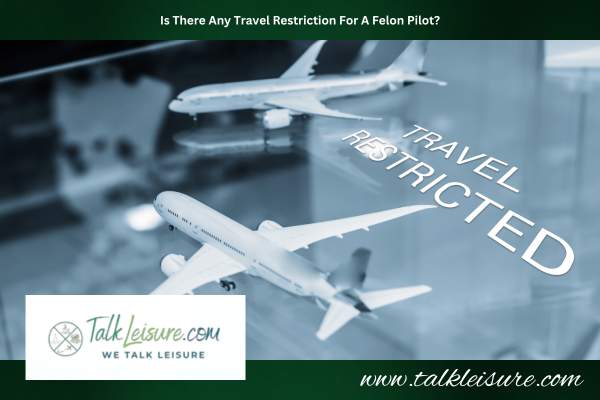
Becoming a licensed pilot is lengthy and expensive, but being a felon isn’t necessarily a disqualifying factor.
Traveling internationally with a felony conviction is not impossible, but it is essential to understand the potential restrictions.
Felony travel restrictions are imposed by the court, government agencies, and airlines, depending on the circumstances.
Courts may order travel restrictions prohibiting felons from contacting specific people or places that will be on their criminal records.
In conclusion, being a felon does not necessarily disqualify individuals from becoming licensed pilots.
Felonies may also come with travel restrictions imposed by courts, government agencies, and airlines.
Final Thoughts
Becoming a pilot is a dream for many people, but what about those with a criminal record?
The FAA does not deny pilot certificates solely based on a felony conviction.
However, if the felony is drug- or alcohol-related, the FAA requires one to wait up to one year before applying for a pilot certificate.
In any case, all applicants must undergo a background check to determine their eligibility.
The final decision will depend on the type of conviction, the crime’s severity, and the actions taken following the incident.
If not disqualified by the TSA, a felon can receive a standard Pilot License, including Sport Pilot, Recreational Pilot, Private Pilot, Commercial Pilot, and Airline Transport Pilot.
The type of license one can obtain will depend on meeting the FAA requirements, passing medical exams, and the number of flight hours required for each level.
In conclusion, while having a felony on one’s record may make the process more challenging, it is still possible for an individual to become a pilot.
The FAA does not automatically disqualify a person with a felony conviction but evaluates each case individually.
One can achieve their dream of becoming a pilot with effort and determination.
FAQs
Can Felons Fly On Planes In The US?
Travel restrictions are imposed differently by the court, the government, and the airlines, many of which might prevent you from entering certain countries.
A felony conviction can limit your ability to travel to some countries, but it does not necessarily bar you from flying within the US.
If you have a felony on your record, you can enroll in pilot training courses.
The FAA does not deny pilot certificates only based on a felony conviction.
To become a pilot, the first step is to obtain a Student Pilot Certificate, which is the same if you have a felony on your record.
You must meet the requirements set by the FAA to receive this certificate.
So, felons can fly planes within the US, but restrictions and requirements apply.
Where Can US Felons Not Travel To?
Felons wanting to travel internationally need to be aware of the potential travel restrictions they may face.
The ability of US felons to travel depends on their legal status and the country they intend to visit.
In most cases, felons who have served their sentence can enter other countries assuming they have a valid passport, but there are some exceptions.
It is advisable to research the entry requirements of the countries you intend to visit before your trip.
The court, government, or airlines can impose travel restrictions. The court may order a felon to stay away from a particular person or place, which could result in travel restrictions.
Can A Felon Fly To Australia?
Felons planning to fly to Australia might wonder if they can enter the country.
First, it’s important to note that Australia has strict policies regarding the entry of felons and those with criminal records.
Whether or not a felon can enter Australia depends on various factors.
Generally speaking, felons with a conviction resulting in a prison sentence of 12 months or more are not allowed to enter Australia. This includes time served and suspended sentences.
However, in some cases, a felon may be able to enter Australia if they obtain a visa or a special exemption from the Australian government.
It’s important to note that obtaining a visa or exemption is not guaranteed and often requires extensive documentation.
In addition, the Australian government may deny entry to felons deemed to threaten the Australian community or the country’s security.

